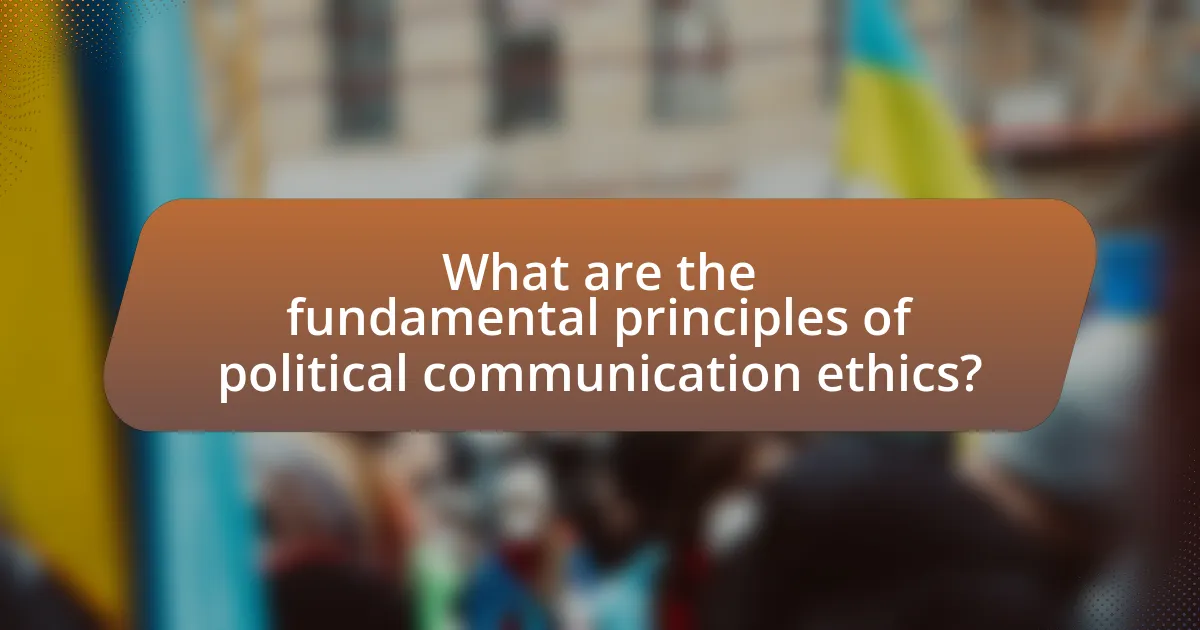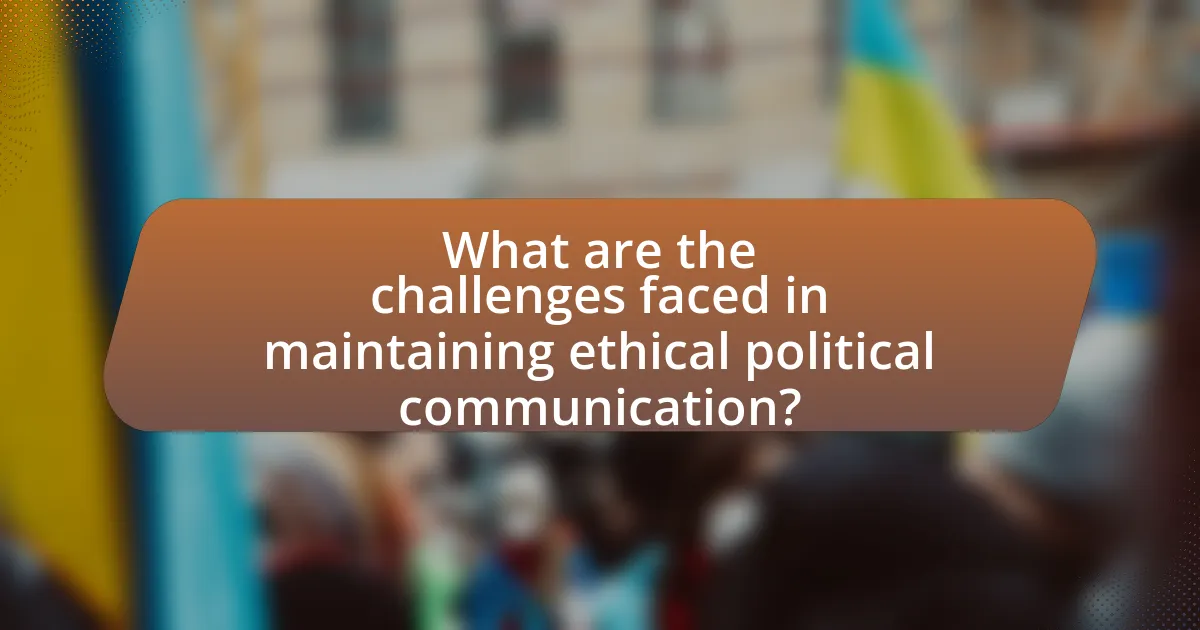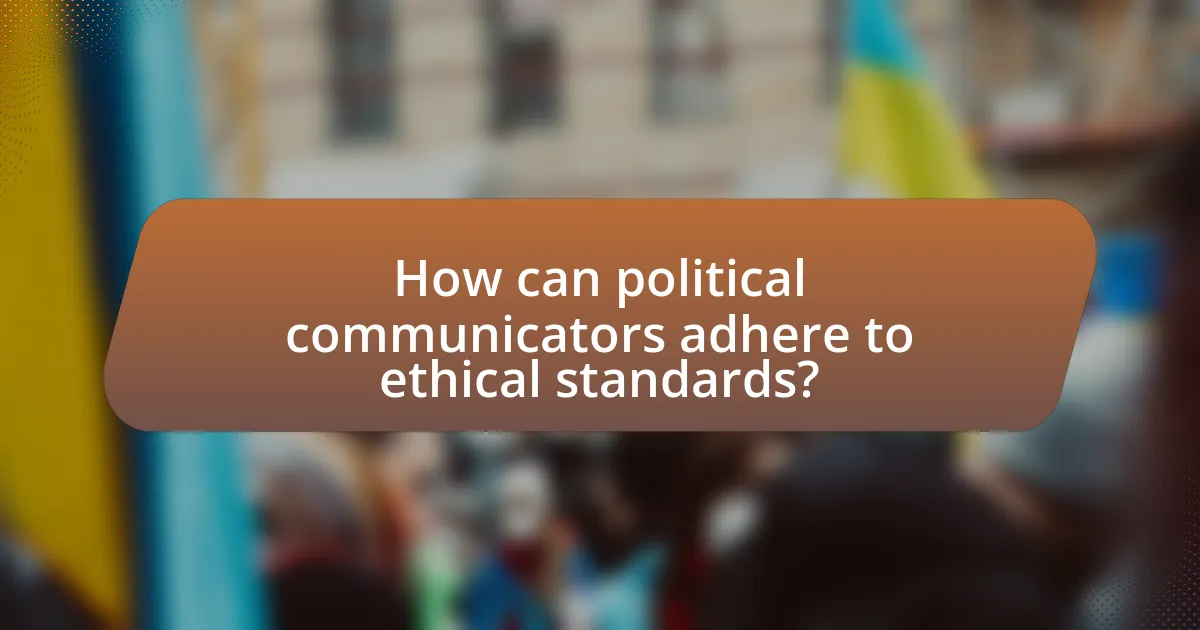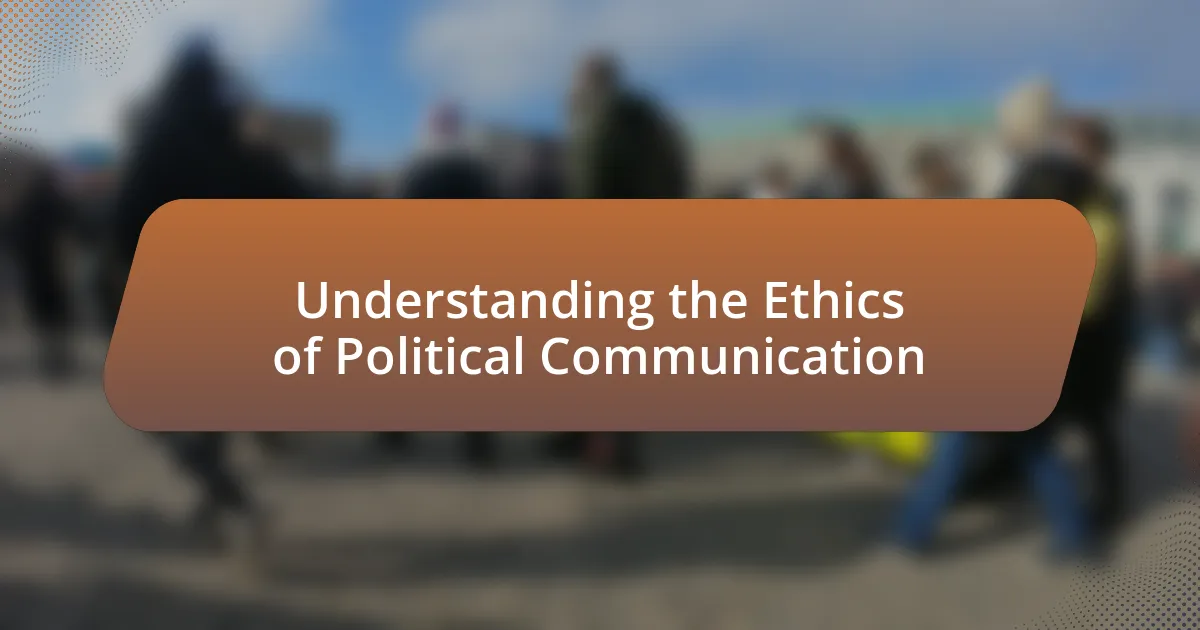The article “Understanding the Ethics of Political Communication” examines the fundamental principles that govern ethical political communication, including truthfulness, transparency, accountability, and respect for the audience. It explores how these principles shape political messaging and influence public trust, highlighting the importance of ethical considerations in fostering informed citizenry and democratic engagement. The article also addresses the challenges posed by misinformation and disinformation, the ethical dilemmas in political advertising, and the mechanisms that ensure accountability among political communicators. Additionally, it discusses best practices for ethical messaging and the resources available for improving ethical standards in political communication.

What are the fundamental principles of political communication ethics?
The fundamental principles of political communication ethics include truthfulness, transparency, accountability, and respect for the audience. Truthfulness mandates that political communicators provide accurate information, as misinformation can undermine democratic processes. Transparency requires that communicators disclose their motives and affiliations, fostering trust between the public and political entities. Accountability emphasizes the responsibility of communicators to answer for their actions and statements, ensuring that they uphold ethical standards. Lastly, respect for the audience involves recognizing the audience’s right to receive honest and relevant information, which is essential for informed decision-making in a democratic society. These principles are crucial for maintaining integrity and fostering a healthy political discourse.
How do ethical considerations shape political messaging?
Ethical considerations significantly shape political messaging by guiding the integrity and honesty of communication strategies. Politicians and their campaigns must adhere to ethical standards to foster trust and credibility among constituents. For instance, the American Political Science Association emphasizes that ethical political communication promotes informed citizenry and democratic engagement. Furthermore, adherence to ethical norms can prevent misinformation, as seen in the 2020 U.S. elections where fact-checking organizations played a crucial role in countering false narratives. Thus, ethical considerations not only influence the content and delivery of political messages but also impact public perception and engagement in the political process.
What role does truthfulness play in political communication?
Truthfulness is essential in political communication as it fosters trust between politicians and the public. When political figures communicate honestly, they enhance their credibility and legitimacy, which are crucial for effective governance. Research indicates that voters are more likely to support candidates who are perceived as truthful; for instance, a study by the Pew Research Center found that 70% of Americans believe that honesty is a key quality for political leaders. This trust not only influences electoral outcomes but also impacts public engagement and civic participation, as citizens are more likely to engage with a political system they perceive as transparent and truthful.
How does transparency impact public trust in political discourse?
Transparency significantly enhances public trust in political discourse by fostering accountability and openness among political actors. When politicians and institutions provide clear, accessible information about their actions and decisions, it reduces the perception of corruption and misinformation. Research indicates that higher levels of transparency correlate with increased public confidence in government, as evidenced by a study published in the Journal of Politics, which found that citizens are more likely to trust political leaders who openly share information about policy-making processes. This trust is crucial for effective governance and civic engagement, as it encourages public participation and dialogue, ultimately leading to a more informed electorate.
Why is accountability important in political communication?
Accountability is crucial in political communication because it ensures that political actors are answerable for their actions and decisions, fostering trust and transparency in governance. When politicians and institutions are held accountable, they are more likely to communicate honestly and responsibly, which enhances public engagement and informed decision-making. Research indicates that accountability mechanisms, such as media scrutiny and public oversight, lead to better policy outcomes and increased citizen satisfaction with democratic processes. For instance, studies have shown that countries with strong accountability frameworks experience lower levels of corruption and higher levels of public trust in government.
What mechanisms ensure accountability among political communicators?
Accountability among political communicators is ensured through mechanisms such as regulatory frameworks, media scrutiny, and public engagement. Regulatory frameworks, including laws governing campaign finance and transparency, mandate disclosure of information, thereby holding communicators accountable for their actions. Media scrutiny acts as a watchdog, investigating and reporting on political communication practices, which can lead to public exposure of unethical behavior. Additionally, public engagement through civic participation and feedback mechanisms allows citizens to voice concerns and demand accountability from political communicators, reinforcing ethical standards in political discourse.
How can voters hold politicians accountable for their communication?
Voters can hold politicians accountable for their communication by actively engaging in fact-checking and demanding transparency. When voters verify claims made by politicians through reliable sources, they can challenge misinformation and promote accountability. For instance, organizations like FactCheck.org and PolitiFact provide resources that help voters assess the accuracy of political statements. Additionally, voters can utilize social media platforms to voice concerns and mobilize public opinion, thereby pressuring politicians to adhere to ethical communication standards. This active participation fosters a culture of accountability and encourages politicians to communicate truthfully.

What are the challenges faced in maintaining ethical political communication?
Maintaining ethical political communication faces several challenges, including misinformation, polarization, and lack of transparency. Misinformation undermines trust and can lead to misinformed public opinion, as seen in various electoral campaigns where false narratives spread rapidly through social media. Polarization creates an environment where individuals are less likely to engage in constructive dialogue, often leading to echo chambers that reinforce biased perspectives. Additionally, a lack of transparency in political messaging can obscure the truth, making it difficult for citizens to make informed decisions. These challenges highlight the complexities involved in fostering ethical standards in political discourse.
How do misinformation and disinformation affect political ethics?
Misinformation and disinformation significantly undermine political ethics by eroding trust in democratic institutions and distorting public discourse. When false information is disseminated, it can lead to misguided public opinions and decisions, ultimately compromising the integrity of electoral processes. For instance, a study by the Pew Research Center found that 64% of Americans believe fabricated news stories cause confusion about basic facts, which can skew voter perceptions and influence election outcomes. This manipulation of information not only misleads citizens but also creates an environment where ethical political behavior is compromised, as politicians may exploit these narratives for personal or party gain.
What strategies can be employed to combat misinformation in politics?
To combat misinformation in politics, strategies such as fact-checking, media literacy education, and promoting transparency in information sources can be employed. Fact-checking organizations, like PolitiFact and FactCheck.org, systematically verify claims made by politicians and media, providing the public with accurate information. Media literacy education equips individuals with critical thinking skills to discern credible sources from unreliable ones, thereby reducing the spread of false information. Additionally, promoting transparency involves encouraging politicians and organizations to disclose their sources and funding, which helps the public evaluate the credibility of the information presented. These strategies collectively enhance public awareness and foster a more informed electorate.
How does social media influence the spread of disinformation?
Social media significantly influences the spread of disinformation by enabling rapid dissemination and amplifying false narratives. Platforms like Facebook and Twitter allow users to share content widely, often without verification, leading to viral misinformation. A study by the Massachusetts Institute of Technology found that false news stories are 70% more likely to be retweeted than true stories, highlighting the platform’s role in prioritizing engagement over accuracy. Additionally, algorithms that favor sensational content further exacerbate the issue, creating echo chambers where users are exposed primarily to misleading information that aligns with their beliefs.
What ethical dilemmas arise from political advertising?
Political advertising presents several ethical dilemmas, primarily concerning misinformation, manipulation, and transparency. Misinformation occurs when advertisements disseminate false or misleading information about candidates or policies, which can distort public perception and undermine democratic processes. Manipulation arises when emotional appeals or fear tactics are employed to sway voters, often prioritizing emotional response over informed decision-making. Transparency issues emerge when the sources of funding for political ads are obscured, leading to questions about accountability and the influence of special interests on political outcomes. These dilemmas challenge the integrity of political communication and the ethical responsibilities of advertisers in shaping public discourse.
How do negative ads impact public perception and voter behavior?
Negative ads significantly influence public perception and voter behavior by shaping opinions and increasing voter turnout. Research indicates that exposure to negative advertising can lead to a decline in favorability towards the targeted candidate, as evidenced by a study published in the Journal of Politics, which found that negative ads can decrease a candidate’s approval ratings by as much as 10%. Furthermore, negative ads often mobilize voters by highlighting issues that resonate with them, leading to increased engagement in the electoral process. For instance, a study by the Pew Research Center revealed that negative campaigning can enhance voter motivation, particularly among those who feel strongly about the issues presented. Thus, negative ads play a crucial role in both altering perceptions of candidates and driving voter participation.
What regulations exist to govern political advertising ethics?
Regulations governing political advertising ethics include the Federal Election Commission (FEC) rules in the United States, which mandate transparency in funding sources and require disclosures of sponsors for political ads. These regulations are designed to prevent misleading information and ensure that voters are informed about who is financing political messages. Additionally, many states have their own laws that further regulate political advertising, including restrictions on false statements and requirements for disclaimers. The enforcement of these regulations is crucial for maintaining integrity in political communication and fostering public trust in the electoral process.

How can political communicators adhere to ethical standards?
Political communicators can adhere to ethical standards by ensuring transparency, accuracy, and accountability in their messaging. Transparency involves openly disclosing sources and intentions behind communications, which builds trust with the audience. Accuracy requires that all information shared is fact-checked and verified, minimizing the spread of misinformation. Accountability means taking responsibility for the content shared and being willing to correct any errors promptly. Research indicates that adherence to these principles not only enhances credibility but also fosters a more informed electorate, as seen in studies by the Pew Research Center, which highlight the importance of trust in political communication.
What best practices should political communicators follow?
Political communicators should prioritize transparency, accuracy, and ethical messaging. Transparency involves openly sharing information about funding sources and affiliations, which builds trust with the audience. Accuracy requires verifying facts before dissemination to avoid misinformation, as studies show that false information can significantly influence public opinion and voter behavior. Ethical messaging includes respecting opponents and avoiding personal attacks, which fosters a healthier political discourse. Research indicates that campaigns adhering to these best practices are more likely to engage positively with constituents and achieve long-term credibility.
How can political messages be crafted to ensure ethical integrity?
Political messages can be crafted to ensure ethical integrity by adhering to principles of transparency, accuracy, and respect for the audience. Transparency involves clearly disclosing the sources of information and the motivations behind the message, which builds trust with the audience. Accuracy requires that all claims made in the political message are fact-checked and supported by credible evidence, reducing the risk of misinformation. Respect for the audience entails avoiding manipulative tactics and recognizing the diverse perspectives within the community. For instance, the American Psychological Association emphasizes the importance of ethical communication in fostering informed public discourse, highlighting that ethical integrity in political messaging not only enhances credibility but also promotes civic engagement.
What role does audience engagement play in ethical communication?
Audience engagement is crucial in ethical communication as it fosters transparency and accountability between communicators and their audience. Engaging the audience allows for a two-way dialogue, ensuring that diverse perspectives are considered and respected, which is essential for ethical discourse. Research indicates that when audiences are actively involved, they are more likely to critically evaluate information, leading to informed decision-making and reducing the spread of misinformation. For instance, a study by the Pew Research Center found that engaged audiences are better at discerning credible sources, which enhances the overall integrity of political communication.
What resources are available for improving ethical political communication?
Resources available for improving ethical political communication include training programs, guidelines from professional organizations, and academic literature. Training programs, such as those offered by the National Institute for Civil Discourse, focus on fostering respectful dialogue and understanding diverse perspectives. Professional organizations like the American Political Science Association provide ethical guidelines that emphasize integrity and transparency in communication. Additionally, academic literature, including works like “The Ethics of Political Communication” by David M. Anderson, offers insights into ethical practices and case studies that illustrate effective communication strategies. These resources collectively support the development of ethical standards in political discourse.
How can training programs enhance ethical standards in political communication?
Training programs can enhance ethical standards in political communication by providing participants with the knowledge and skills necessary to recognize and address ethical dilemmas. These programs often include case studies, role-playing scenarios, and discussions on ethical frameworks, which help individuals understand the implications of their communication choices. Research indicates that training can lead to improved ethical decision-making; for instance, a study by the American Political Science Association found that political communication training significantly increased awareness of ethical issues among participants. By fostering a culture of accountability and transparency, training programs ultimately contribute to higher ethical standards in political discourse.
What organizations promote ethical practices in political communication?
Organizations that promote ethical practices in political communication include the American Political Science Association (APSA), the International Communication Association (ICA), and the National Communication Association (NCA). These organizations provide guidelines, resources, and forums for discussing ethical standards in political discourse. For instance, APSA emphasizes the importance of integrity and transparency in political research and communication, while ICA focuses on the ethical implications of communication practices in various contexts, including politics. NCA also advocates for ethical communication practices, offering resources to enhance the integrity of political messaging.
